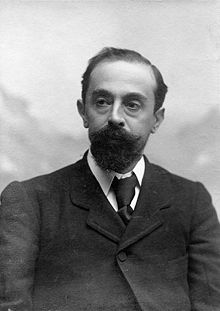Joan Maragall
Joan Maragall i Gorina (10 October 1860 – 20 December 1911) was a Catalan poet, journalist and translator, the foremost member of the modernisme movement in literature. His manuscripts are preserved in the Joan Maragall Archive of Barcelona.

Quotes
editLliga (Catalan League) article (December 1909)
editRiots broke out in Barcelona during the Tragic Week of 1909 (26 July-1 August 1909). They began as a strike in protest against conscription into the army. Catalan workers were being shipped off, untrained, to suppress an Islamic uprising in Morocco. As the riots developed the Catholic Church became a target. The Boletin Oficial Eclesiastica de la Diocesis of 9 August recorded 12 churches and 40 religious establishments destroyed. In December 1909 Maragall wrote an article in the daily newspaper of the Lliga (Catalan League), about these events. Further, he imagined a sermon he would have delivered in a destroyed church if he had been a priest.
- I had never heard a Mass like that one.. the church vault was split open, the walls were rasped and peeling, the altars were wrecked or had been thrown out; worst of all, that great dark hole at the end, where the high altar had been, the paving hidden beneath the powder and rubble, no pews to sit on, everyone standing or kneeling before a wooden table with a crucifix placed on it, a sunbeam shining sharply down through a gap in the vault and a cloud of flies dancing in the harsh light that illuminated the whole Church and made it seem as though we were hearing Mass in the middle of the street. [-] I had never heard a Mass like that one [-] The bread and the Wine appeared as though they were fresh: the Host appeared to be beating and, in the sunlight, when the Wine was poured into the chalice, it appeared to be blood that was flowing [-] and then the thought, the sentiment occurred to me that Mass should always be heard in this way, in fear and trembling.
- Come in, enter, the door is wide open! It is you yourselves who have opened it with the fire and iron of your hatred:[-] By destroying this church, you have restored the Church, the Church that was founded for you, the poor, the oppressed , the desperate...it is you, with your poverty, your rebellion and your despair, who have rammed down the door, it is you who have breached her stout and solid walls, and you who have re-conquered her. Fire has built, blasphemy has purified, hatred of Christ has returned Christ to his house.
- Think deeply about this: what are you going to ask of Christ when you are in his Church? You come stepping in softly, seeking quiet under her vaulted roofs (unless, of course, you come out of mere vanity) in order to forget your problems and preoccupations [-] languidly immersing yourself in the majesty of the sacred chorales and in the aromatic clouds of incense: and then to sleep[-] But this is not the peace of Christ. My peace I give you, my peace I leave you. He said My, which is not the peace of this world. But you want to establish the Church in the peace of the world, and that is why the others, when they come, cannot enter without war cries rising from their overwrought lungs. They rebel, filling the temple with blashemous roars, they eject the terrified faithful, who had been half asleep, they insult or kill the ministers at the altar, knock over the altar itself ,smash the stone saints, burn the church [-] so it is that she once again becomes, for them, the church of the Christ that died on the cross. [-] This time, do not leave her rebuilding to others. Do not wish to put up sturdier walls for these will not give her a better defense [-] Nor should you ask the rich to contribute too much money for the reconstruction, lest the poor, should receive the benefice with mistrust. Let it be the poor who rebuild her, for then they will do so according to their fashion and only in this way will they love her.